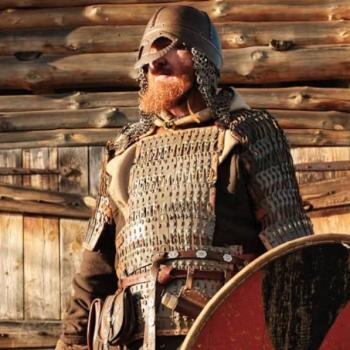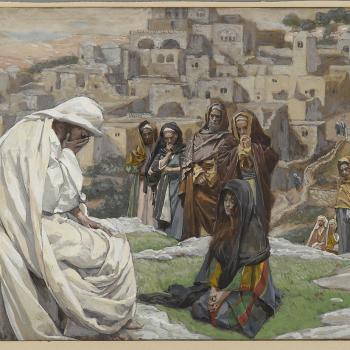 Violence in the Bible is a difficult issue for Christians, especially when God commands it. This post raises the question of violence in biblical stories. The next two consider the history behind the stories and their place in Scripture.
Violence in the Bible is a difficult issue for Christians, especially when God commands it. This post raises the question of violence in biblical stories. The next two consider the history behind the stories and their place in Scripture.
Episode 13-1 of the Rowing with Michael Series: A journey through the Jewish/Christian Scriptures in Verse and Commentary. Introduction and Contents for this series HERE.
Michael, row the boat ashore. Alleluia….
Mighty Sampson had lots of hair, Alleluia.
Until Delilah shaved him bare. Alleluia.
When that hair grew back again, Alleluia.
What a ruckus he raised then! Alleluia.Goliath was lookin’ for a fight. Alleluia.
Finally young David said, “Well, alright.” Alleluia.
Five smooth stones but just one shot. Alleluia.
Scared of that giant……Not! Alleluia.
Samson’s story
For Samson raising a ruckus was a way of life:
- He murders 30 Philistines to get their suits to pay off a bet that he lost because he couldn’t keep his mouth shut in front of his Philistine bride.
- He burns up the Philistines’ grain fields by setting 300 foxes loose in the fields tied together by their tails with a burning torch between each pair. That was because his father-in-law married his bride off to somebody else after Samson stomped off in a huff.
- He allows himself to be tied up and delivered to the enemy by fellow Israelites, who are afraid of war with their Philistine overlords. He’s just angling for a chance to kill a thousand more.
Over and over Samson gets into trouble because of his weakness for Philistine women. The one that finally does him in is Delilah. Three nights in a row she begs him to tell her the secret of his strength. Three times he tells her what to do to render him “as weak as any other man.” Three times her relatives who are lying in wait to capture him find that Samson lied. When on the fourth night Delilah cries and accuses him of not loving her, Samson breaks down and tells her the real story:
No razor has touched my head, for I have been consecrated to God from my mother’s womb. If I am shaved, my strength will leave me, and I shall be as weak as any other man. (Judges 16:17)
So the Philistines finally have their man and gouge his eyes out for good measure. It’s Samson who has the last laugh, however. Bound and blind, but with his hair and strength grown back, standing between two supporting pillars of the temple to the Philistines’ god Dagon, Samson brings down the temple upon himself and a throng of worshipers.
This is mostly legend, but Samson could easily have been a real person, a battle hero of some renown. The Bible says he judged Israel for 20 years, but it seems he didn’t accomplish much. The Philistines were as much in control at the end of this period as ever.
Wars and other violent customs
David’s story is entirely different. David knows what he wants—to be king of a strong, independent, prosperous nation—and systematically goes about getting it. He also is a hero in wars with the Philistines, but his real accomplishment is to unite the 12 tribes of Israel with him as the leader. This took personal bravery and skill, but also conniving and ruthlessness as required. History, written by the winning side, chose to remember a man entirely devoted to doing God’s will—except when he, too, fell prey to lust. (This previous post includes that story.)
For me as a follower of a Biblical faith, there’s a troublesome question behind these stories of revenge and conquest. How does the Bible’s morality relate to the God I believe in? Some of the morality the Bible exhibits is just wrong. Slavery and polygamy are accepted institutions. I’m pretty much OK with that, given the time and culture. The Bible actually requires a kind of justice for slaves. But then, rebellious sons are to be stoned and prostitutes burned or stoned; worshiping the wrong god is a capital crime punishable by God himself.
The stories of the wars of conquest the Israelites fought, recorded in the Book of Joshua, Chapters 6-11, are where I have the biggest problem. They include the slaughtering of whole cities. Crimes against humanity is what we call it today. Did God really direct these battles, as the Bible says? That and why these stories are in the Bible at all are the questions the next blogs in this series will explore.











